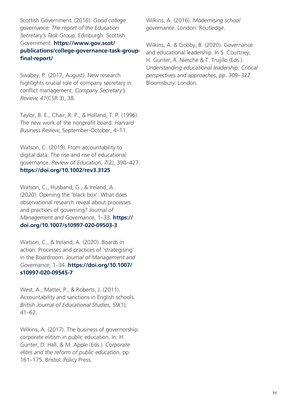
71
Scottish Government. (2016). Good college
governance: The report of the Education
Secretary's Task Group. Edinburgh: Scottish
Government. https://www.gov.scot/
publications/college-governance-task-groupfinal-report/
Swabey, P. (2017, August). New research
highlights crucial role of company secretary in
conflict management. Company Secretary's
Review, 41(CSR 3), 38.
Taylor, B. E., Chair, R. P., & Holland, T. P. (1996).
The new work of the nonprofit board. Harvard
Business Review, September-October, 4-11.
Watson, C. (2019). From accountability to
digital data: The rise and rise of educational
governance. Review of Education, 7(2), 390-427.
https://doi.org/10.1002/rev3.3125
Watson, C., Husband, G., & Ireland, A.
(2020). Opening the 'black box': What does
observational research reveal about processes
and practices of governing? Journal of
Management and Governance, 1-33. https://
doi.org/10.1007/s10997-020-09503-3
Watson, C., & Ireland, A. (2020). Boards in
action: Processes and practices of 'strategising'
in the Boardroom. Journal of Management and
Governance, 1-34. https://doi.org/10.1007/
s10997-020-09545-7
West, A., Mattei, P., & Roberts, J. (2011).
Accountability and sanctions in English schools.
British Journal of Educational Studies, 59(1),
41-62.
Wilkins, A. (2017). The business of governorship:
corporate elitism in public education. In: H.
Gunter, D. Hall, & M. Apple (Eds.). Corporate
elites and the reform of public education, pp.
161-175. Bristol: Policy Press.
Wilkins, A. (2016). Modernising school
governance. London: Routledge.
Wilkins, A. & Gobby, B. (2020). Governance
and educational leadership. In S. Courtney,
H. Gunter, R. Niesche & T. Trujillo (Eds.).
Understanding educational leadership: Critical
perspectives and approaches, pp. 309-322.
Bloomsbury: London.